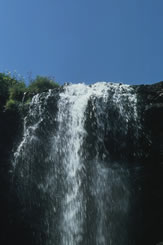 EWASH's Position Paper on Seawater Desalination for Gaza: Implications and Challenges
EWASH's Position Paper on Seawater Desalination for Gaza: Implications and Challenges
The Emergency Water, Sanitation and Hygiene group (EWASH), a coalition of almost 30 organisations working on water issues in the Occupied Palestinian Territory (oPt), and Palestinian civil society organizations wished to express through this paper their concerns regarding current plans to construct a seawater desalination plant in Gaza.
Overview of the problem The 1.6 million population of the Gaza strip is in dire need of a solution for drinking water.
Gaza’s population is forced to rely on a small portion (southern end) of the Coastal Aquifer, a shared water resource with Israel, as their only water resource. This is due to Israel’s continued control and exploitation of the trans-boundary (shared) water resources in the oPt, including the Coastal Aquifer and its blockade of Gaza which prevents the importation of water and entry of materials needed to upgrade and repair Gaza’s deteriorating water and sanitation infrastructure. Gaza’s share of the aquifer is not enough to serve the needs of Gaza’s population and as such is being over-exploited by up to three times its sustainable yield. Decades of over-pumping and heavy pollution from seawater intrusion and rising of underlying saline water, waste water and agrochemicals have left the aquifer highly polluted with dangerous levels of chlorides and nitrates, and in danger of irreparable damage.
Currently over 90 percent of the water extracted from the costal aquifer is not potable, and the Palestinian Water Authority (PWA) estimates that the aquifer will become completely unusable as soon as 2016.1 Current abstraction of water from the Coastal Aquifer is at 160 million cubic meters per year (MCM/Y) with recharge estimated at 50 to 60 MCM/Y.2 Gaza’s population is expected to increase by half a million within eight years and the Palestinian Water Authority (PWA) expects demand for fresh water to grow to 260MCM/Y by 2020, a 60% increase on current levels of abstraction from the aquifer.3 As such, Gaza is in need of additional quantities of water to meet demand.
--
About EWASH:
Founded in 2002, the Emergency Water, Sanitation and Hygiene group (EWASH) is a coalition of humanitarian agencies working together to coordinate interventions, respond to needs, share information and do advocacy on the water and sanitation sector in the OPT. Members include local and international organizations and UN Agencies. Visit www.ewash.org
| Contact information |
GHADA SNUNU | E-WASH* Advocacy Task Force Officer Oxfam | Gaza, Occupied Palestinian Territory
(email: gsnunu@gmail.com) Phone: Mobile: 0598910834 | Office: (08) 2822553/4 |
|---|---|
| News type | Inbrief |
| File link |
http://www.ewash.org/files/library/EWASH%20Position%20Paper%20on%20Seawater%20Desaliantion%20for%20Gaza.pdf |
| Source of information | EWASH |
| Keyword(s) | Seawater Desalination |
| Subject(s) | ANALYSIS AND TESTS , CHARACTERISTICAL PARAMETERS OF WATERS AND SLUDGES , DRINKING WATER , DRINKING WATER AND SANITATION : COMMON PROCESSES OF PURIFICATION AND TREATMENT , ENERGY , FINANCE-ECONOMY , HEALTH - HYGIENE - PATHOGENIC MICROORGANISM , HYDRAULICS - HYDROLOGY , INFRASTRUCTURES , NATURAL MEDIUM , POLICY-WATER POLICY AND WATER MANAGEMENT , PREVENTION AND NUISANCES POLLUTION , RIGHT , RISKS AND CLIMATOLOGY , SANITATION -STRICT PURIFICATION PROCESSES , SLUDGES , WATER DEMAND |
| Relation | http://www.thirstingforjustice.org |
| Geographical coverage | Palestine,Gaza, |
| News date | 09/03/2014 |
| Working language(s) | ENGLISH |
 you are not logged in
you are not logged in





